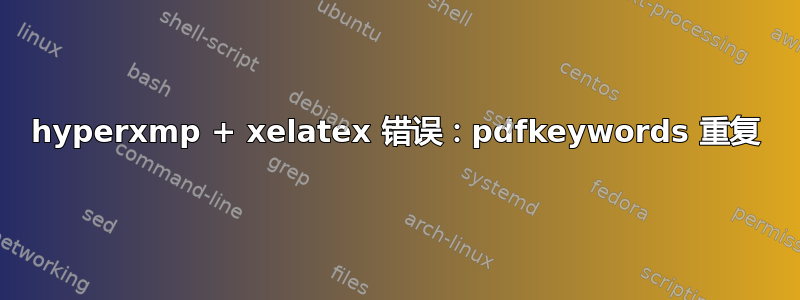
我发现一个与允许设置的pdfkeywords元数据字段相关的烦人的错误(?) 。当与结合使用并且文档使用时,关键字会在 pdf 元数据中重复(在常规 pdf 属性和 XMP 元数据中)。hyperrefhyperrefhyperxmpxelatex
以下是一份 MWO:
\documentclass{article}
\usepackage[xetex]{hyperref}% remove "xetex" parameter when compiling with pdflatex instead of xelatex
\hypersetup{
pdfauthor = {Matthias},
pdftitle = {MWO},
pdfkeywords = {Test, MWO, This is a test, Lipsum}
}
\usepackage{hyperxmp}
\usepackage{lipsum}
\begin{document}
\lipsum[1-3]
\end{document}pdflatex当我用(删除xetex中的参数)编译它时\usepackage{hyperref},我得到:
- 在 PDF 属性的关键字字段中:
测试,MWO,这是一个测试,Lipsum
- 在 XMP 元数据的关键字字段中:
测试;MWO;这是一个测试;Lipsum
这是预期的行为(在 XMP 字段hyperxmp中用逗号替换,参见文档)。;hyperxmp
但是,当我编译 MWO 时,xelatex我得到:
- 在 PDF 属性的关键字字段中:
“测试,MWO,这是一个测试,Lipsum”;测试;MWO;这是一个测试;Lipsum
- 在 XMP 元数据的关键字字段中:
“测试,MWO,这是一个测试,Lipsum”;测试;MWO;这是一个测试;Lipsum
如您所见,关键字重复了。首先,,将 -separated 放在中间""(并视为单个关键字),然后;是 -separated 序列。
我尝试过更改包加载顺序并使用 进行编译xelatex而不指定xetexon 参数\usepackage{hyperref},但都无济于事。有什么方法可以修复或解决这个问题吗?
答案1
2011/06/12 v1.4 版本中的软件包hyperxmp不使用 UTF-8 来处理 XMP 数据。相反,数据字节以 PDFDocEncoding 或 UTF-16BE 给出。因此,其 trimspaces 宏也会中断。如果是 XeTeX,BOM(字节顺序标记)会写得不正确...
\pdfstringdef(和朋友)产生的字符串\@pdfauthor可以具有依赖于选项设置和驱动程序的不同编码。\ifHy@unicode对于编码检测没有用。pdfencoding=auto字符串也可以有 PDFDocEncoding!此外,XeTeX 也有一个例外,其中字符串可能有大字符(字符代码 > 127)。与所有其他驱动程序不同,如果应用程序想要写入任意二进制数据,XeTeX 只会提供一个非常丑陋的未指定和不完整的接口。
可以通过查找为 Unicode 字符串设置的 BOM 来检测字符串\pdfstringdef。此外(对于 XeTeX),还需要检查字符串中是否有大字符。
下一步写入 XMP 数据。软件包hyperxmp使用 UTF-8。因此,下面的补丁使用 XML 转义将字符串编码为 UTF-8。(使用原始 PDFDocEncoding 或 Unicode 是错误的,这两种编码都不同于 UTF-8。)
该补丁还修复了 XeTeX 和 LuaTeX 的 BOM 标记。
\documentclass{article}
\usepackage[
pdfencoding=auto
% unicode,
]{hyperref}
\hypersetup{
pdfauthor = {Matthias<abc>},
pdftitle = {MWO\textalpha\textomega},
pdfkeywords = {Test, MWO, This is a test, Lipsum}
}
\usepackage{hyperxmp}
\usepackage{ltxcmds}[2010/04/26]
\usepackage{ifxetex}
\usepackage{ifluatex}
\makeatletter
\newif\ifhyxmp@unicodetex
\ifluatex
\hyxmp@unicodetextrue
\else\ifxetex
\hyxmp@unicodetextrue
\fi\fi
\renewcommand*{\hyxmp@xmlify}[1]{%
\gdef\hyxmp@xmlified{}%
% Escaped PDF string -> PDFDocEncoding/Unicode
\EdefUnescapeString\hyxmp@text{#1}%
\ifhyxmp@unicodetex
% PDFDocEncoding/Unicode -> UTF-32BE
\hyxmp@is@unicode\hyxmp@text{%
\StringEncodingConvert
\hyxmp@text\hyxmp@text{utf16be}{utf32be}%
}{%
\ifxetex
\hyxmp@xetex@crap
\else
\StringEncodingConvert
\hyxmp@text\hyxmp@text{pdfdoc}{utf32be}%
\fi
}%
% UTF-32BE -> UTF-32BE as hex string
\EdefEscapeHex\hyxmp@text{\hyxmp@text}%
% UTF-32BE -> XML in ASCII
\edef\hyxmp@text{%
\expandafter
}\expandafter\hyxmp@toxml@unicodetex\hyxmp@text
\relax\relax\relax\relax\relax\relax\relax\relax
\else
% PDFDocEncoding/Unicode -> UTF-8
\hyxmp@is@unicode\hyxmp@text{%
\StringEncodingConvert
\hyxmp@text\hyxmp@text{utf16be}{utf8}%
}{%
\StringEncodingConvert
\hyxmp@text\hyxmp@text{pdfdoc}{utf8}%
}%
% UTF-8 -> UTF-8 as hex string
\EdefEscapeHex\hyxmp@text{\hyxmp@text}%
% UTF-8 as hex string -> XML in UTF-8 as hex string
\edef\hyxmp@text{%
\expandafter\hyxmp@toxml\hyxmp@text\@empty\@empty
}%
% XML in UTF-8 as hexstring -> XML in UTF-8
\EdefUnescapeHex\hyxmp@text{\hyxmp@text}%
\fi
\global\let\hyxmp@xmlified\hyxmp@text
}
\begingroup
\lccode`\<=254 %
\lccode`\>=255 %
\catcode254=12 %
\catcode255=12 %
\lowercase{\endgroup
\def\hyxmp@is@unicode#1{%
\expandafter\hyxmp@@is@unicode#1<>\@nil
}%
\def\hyxmp@@is@unicode#1<>#2\@nil{%
\ifx\\#1\\%
\expandafter\@firstoftwo
\else
\expandafter\@secondoftwo
\fi
}%
}
\def\hyxmp@toxml@unicodetex#1#2#3#4#5#6#7#8{%
\ifx#1\relax
\else
\ifnum"#1#2#3#4#5#6#7#8>127 %
\uccode`\*="#1#2#3#4#5#6#7#8\relax
\uppercase{%
\edef\hyxmp@text{\hyxmp@text *}%
}%
\else\ifnum"#7#8=`\< %
\edef\hyxmp@text{\hyxmp@text <}%
\else\ifnum"#7#8=`\& %
\edef\hyxmp@text{\hyxmp@text &}%
\else\ifnum"#7#8=`\> %
\edef\hyxmp@text{\hyxmp@text >}%
\else\ifnum"#7#8=`\ %
\edef\hyxmp@text{\hyxmp@text\space}%
\else
\uccode`\*="#7#8\relax
\uppercase{%
\edef\hyxmp@text{\hyxmp@text *}%
}%
\fi\fi\fi\fi\fi
\expandafter\hyxmp@toxml@unicodetex
\fi
}
\def\hyxmp@skipzeros#1{%
\ifx#10%
\expandafter\hyxmp@skipzeros
\fi
}
\def\hyxmp@toxml#1#2{%
\ifx#1\@empty
\else
\ifnum"#1#2=`\& %
26616D703B% &
\else\ifnum"#1#2=`\< %
266C743B% <
\else\ifnum"#1#2=`\> %
2667743B%
\else
#1#2%
\fi\fi\fi
\expandafter\hyxmp@toxml
\fi
}
% In case of xetex the strings by \pdfstringdef can contain
% big chars, then the string ist treated as Unicode.
\begingroup
\def\x#1{\endgroup
\def\hyxmp@xetex@crap{%
\edef\hyxmp@try{%
\expandafter\hyxmp@SpaceOther\hyxmp@text#1\@nil
}%
\let\hyxmp@crap@result=N%
\expandafter\hyxmp@crap@test\hyxmp@try\relax
\ifx\hyxmp@crap@result Y%
\let\hyxmp@text\@empty
\expandafter\hyxmp@crap@convert\hyxmp@try\relax
\else
\StringEncodingConvert
\hyxmp@text\hyxmp@text{pdfdoc}{utf32be}%
\fi
}%
}\x{ }
\begingroup
\catcode`\~=12 %
\lccode`\~=`\ %
\lowercase{\endgroup
\def\hyxmp@SpaceOther#1 #2\@nil{%
#1%
\ifx\relax#2\relax
\expandafter\@gobble
\else
~%
\expandafter\@firstofone
\fi
{\hyxmp@SpaceOther#2\@nil}%
}%
}
\def\hyxmp@crap@test#1{%
\ifx#1\relax
\else
\ifnum`#1>127 %
\let\hyxmp@crap@result=Y%
\expandafter\expandafter\expandafter\hyxmp@skiptorelax
\else
\expandafter\expandafter\expandafter\hyxmp@crap@test
\fi
\fi
}
\def\hyxmp@skiptorelax#1\relax{}
\def\hyxmp@crap@convert#1{%
\ifx#1\relax
\else
\edef\hyxmp@num{\number`#1}%
\ifnum\hyxmp@num>"FFFFFF %
\lccode`\!=\intcalcDiv{\hyxmp@num}{\number"1000000}\relax
\lowercase{\edef\hyxmp@text{\hyxmp@text!}}%
\edef\hyxmp@num{\intcalcMod{\hyxmp@num}{\number"1000000}}%
\else
\edef\hyxmp@text{\hyxmp@text\hyxmp@zero}%
\fi
\ifnum\hyxmp@num>"FFFF %
\lccode`\!=\intcalcDiv{\hyxmp@num}{\number"10000}\relax
\lowercase{\edef\hyxmp@text{\hyxmp@text!}}%
\edef\hyxmp@num{\intcalcMod{\hyxmp@num}{\number"10000}}%
\else
\edef\hyxmp@text{\hyxmp@text\hyxmp@zero}%
\fi
\ifnum\hyxmp@num>"FF %
\lccode`\!=\intcalcDiv{\hyxmp@num}{\number"100}\relax
\lowercase{\edef\hyxmp@text{\hyxmp@text!}}%
\edef\hyxmp@num{\intcalcMod{\hyxmp@num}{\number"100}}%
\else
\edef\hyxmp@text{\hyxmp@text\hyxmp@zero}%
\fi
\ifnum\hyxmp@num>0 %
\lccode`\!=\hyxmp@num\relax
\lowercase{\edef\hyxmp@text{\hyxmp@text!}}%
\else
\edef\hyxmp@text{\hyxmp@text\hyxmp@zero}%
\fi
\expandafter\hyxmp@crap@convert
\fi
}
\begingroup
\catcode0=12 %
\gdef\hyxmp@zero{^^00}%
\endgroup
\def\hyxmp@text{aö€x}
\tracingmacros=1
\hyxmp@xetex@crap
\tracingmacros=0
\renewcommand*{\hyxmp@list@to@xml}[3]{%
\ifx#3\@empty
\else
\hyxmp@add@to@xml{%
_________<dc:#1>^^J%
____________<rdf:#2>^^J%
}%
\bgroup
\hyxmp@xmlify{#3}%
\hyxmp@commas@to@list\hyxmp@list{\hyxmp@xmlified}%
\def\@elt##1{%
\hyxmp@add@to@xml{%
_______________<rdf:li>##1</rdf:li>^^J%
}%
}%
\hyxmp@list
\egroup
\hyxmp@add@to@xml{%
____________</rdf:#2>^^J%
_________</dc:#1>^^J%
}%
\fi
}
\begingroup
\ifhyxmp@unicodetex
\lccode`\!="FEFF %
\lowercase{%
\gdef\hyxmp@bom{!}
}%
\else
\catcode`\^^ef=12
\catcode`\^^bb=12
\catcode`\^^bf=12
\gdef\hyxmp@bom{^^ef^^bb^^bf}%
\fi
\endgroup
\def\hyxmp@construct@packet{%
\gdef\hyxmp@xml{}%
\hyxmp@add@to@xml{<?xpacket begin="\hyxmp@bom" %
id="W5M0MpCehiHzreSzNTczkc9d"?>^^J%
<x:xmpmeta xmlns:x="adobe:ns:meta/" x:xmptk="3.1-702">^^J%
___<rdf:RDF
xmlns:rdf="http://www.w3.org/1999/02/22-rdf-syntax-ns\hyxmp@hash">^^J%
}%
\hyxmp@pdf@schema
\hyxmp@xmpRights@schema
\hyxmp@dc@schema
\hyxmp@photoshop@schema
\hyxmp@mm@schema
\hyxmp@add@to@xml{%
___</rdf:RDF>^^J%
</x:xmpmeta>^^J%
\hyxmp@padding
<?xpacket end="w"?>^^J%
}%
}
\renewcommand*{\hyxmp@reencode}[1]{%
% dummy only used for \@pdfmetalang in \begin{document}
}
\AtBeginDocument{%
\@ifpackageloaded{hyperref}{%
\ifx\@pdflang\@empty
\let\@pdfmetalang=\hyxmp@x@default
\else
\edef\@pdfmetalang{\@pdflang}%
\fi
\hyxmp@xmlify\@pdfmetalang
}{}%
}
\makeatother
\usepackage{lipsum}
\begin{document}
\lipsum[1-3]
\end{document}
我没有测试所有可能的情况和驱动程序,因此可能存在一些未发现的问题。但也许补丁有助于改进软件包。
答案2
截至 2020 年,这个问题已得到解决。您也不再需要手动指定 hyperref 的驱动程序。


